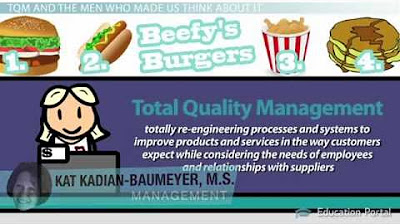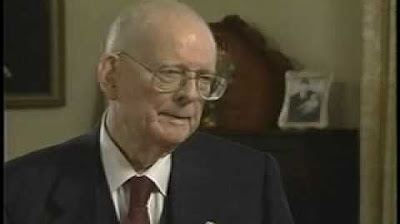Total Quality Management - Deming Way (Part 1/2)
Summary
TLDRThe script discusses the life and contributions of William Edwards Deming, a pivotal figure in the quality control movement. Born in Iowa, Deming's background in electrical engineering laid the foundation for his critical thinking and mathematical approach to quality. The script highlights his 14 points, emphasizing constancy of purpose, leadership in change, and the balance between quality and productivity. It also touches on the importance of on-the-job training and the influence of Deming's philosophy on companies like General Motors, reflecting the transformative impact of his ideas on the business world.
Takeaways
- 👨🎓 William Edwards Deming, born in 1900 in Iowa, was a significant figure in the field of quality, with a background in electrical engineering.
- 🤔 The speaker suggests that engineers have been major contributors to the field of quality due to their critical thinking and mathematical skills.
- 🏛️ Deming's educational journey included degrees from the University of Wyoming, University of Colorado, and Yale, where he studied mathematical physics.
- 📚 Deming was known for his '14 Points,' which are seen as guiding principles for management to improve quality and productivity.
- 🚀 The first point of Deming's 14 Points emphasizes the importance of constancy of purpose, suggesting that frequent changes in direction can be detrimental.
- 🔄 Deming advocated for a new philosophy of change and leadership, recognizing that the post-WWII era required a different approach to manufacturing and quality.
- ⚖️ He critiqued the reliance on inspection for quality, arguing that it adds cost without necessarily improving outcomes.
- 💡 Deming's fifth point challenges the conventional wisdom by suggesting that productivity and quality can coexist, rather than being at odds.
- 🔄 His philosophy includes the idea of continuous improvement in production and service systems to enhance quality and reduce costs.
- 👥 Deming emphasized the importance of on-the-job training and the rotation of employees to understand different aspects of the organization.
- 🌟 The speaker shares a personal anecdote about working with Deming, highlighting his deep thinking and the thrill of his last major PBS broadcast.
Q & A
Who is William Edwards Deming and where was he born?
-William Edwards Deming was born in 1900 in Sioux City, Iowa. He was an American engineer, professor, author, lecturer, and consultant who is best known for his work in quality control and statistical methodology.
What educational background did Deming have?
-Deming obtained a bachelor's degree in electrical engineering from the University of Wyoming in Laramie, a master's degree from the University of Colorado in Boulder in 1925, and furthered his studies at Yale, where he pursued mathematical physics.
Why are many significant contributors to the field of quality control engineers?
-The script suggests that engineers are significant contributors to the field of quality control because they are trained to think critically and possess a certain level of mathematical maturity and scientific understanding, which are essential for appreciating the important issues in quality control.
What is the significance of Deming's 14 points?
-Deming's 14 points are a set of management principles aimed at transforming organizations to increase quality and productivity. They are considered his commandments to management, providing a framework for continuous improvement and effective leadership.
What does 'create constancy of purpose' mean in the context of Deming's 14 points?
-Creating constancy of purpose refers to maintaining a stable direction and consistent objectives within an organization. It suggests that frequent changes in direction can lead to confusion, loss of morale, and wasted resources.
Why did Deming advocate for a new philosophy of change leadership?
-Deming advocated for a new philosophy of change leadership because he recognized that change was a constant and that organizations needed to adapt to evolving market conditions. He believed that leadership should focus on continuous improvement and quality, rather than just short-term gains.
What was the state of manufacturing globally after World War II, and how did it affect Deming's teachings?
-After World War II, manufacturing capabilities outside of North America were severely limited due to wartime destruction. This situation made North America the primary producer of high technology products, leading to a focus on quantity over quality. Deming's teachings emphasized the need for quality control and continuous improvement, which eventually gained traction as the global market recovered and competition increased.
How did Deming's approach to quality differ from the common practices of his time?
-Deming's approach differed by emphasizing that quality should not be achieved through inspection alone, which was a common practice at the time. He advocated for building quality into the production process itself, reducing reliance on inspection and leading to more efficient and effective outcomes.
What is the significance of 'institute on-the-job training' in Deming's philosophy?
-Institute on-the-job training is significant because it helps employees develop a broader understanding of the organization and its processes. This approach fosters adaptability and a well-rounded workforce, which is crucial for continuous improvement and innovation.
Why did Deming's teachings initially not gain much favor in the United States?
-Deming's teachings were initially not well-received in the United States because the post-World War II era was characterized by a focus on quantity and rapid production. His emphasis on quality and continuous improvement was not aligned with the prevailing business practices of the time.
What is the importance of 'adopt a new philosophy' in Deming's 14 points?
-Adopting a new philosophy is crucial because it signifies a shift in organizational mindset towards valuing quality, continuous improvement, and long-term strategic planning over short-term gains. This philosophy is essential for organizations to remain competitive and innovative.
Outlines

This section is available to paid users only. Please upgrade to access this part.
Upgrade NowMindmap

This section is available to paid users only. Please upgrade to access this part.
Upgrade NowKeywords

This section is available to paid users only. Please upgrade to access this part.
Upgrade NowHighlights

This section is available to paid users only. Please upgrade to access this part.
Upgrade NowTranscripts

This section is available to paid users only. Please upgrade to access this part.
Upgrade NowBrowse More Related Video

¿Quienes son los Gurús de Calidad? Edwards Deming | Philip B. Crosby | Kaoru Ishikawa Joseph Juran

Deming, Juran & Crosby: Contributors to TQM (Total Quality Management)

W. Edwards Deming - Part 2

W. Edwards Deming - Part 1

Tokoh Kunci Berdirinya Soviet Yang Dibunuh Kaumnya Sendiri! Kisah Leon Trotsky |Learning By Googling

Pengantar Bisnis Sesi 11 Produksi dan Manajemen Operasi
5.0 / 5 (0 votes)